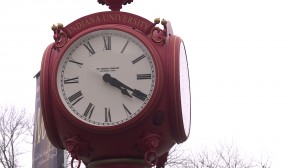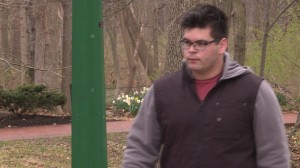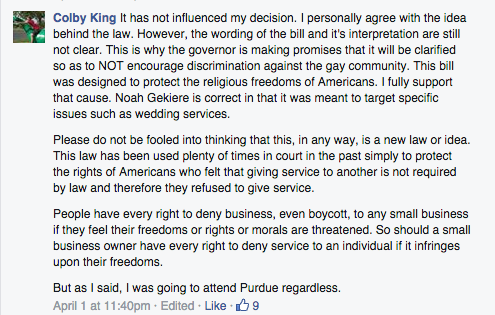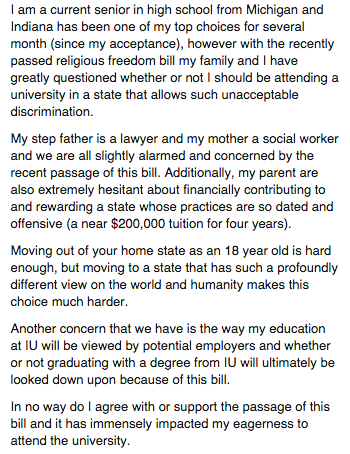Indiana’s Reputation Post-RFRA Reaches Potential College Students

Universities around Indiana are responding to the religious freedom bill passed last week. (Photo Credit: Barbara Harrington/WTIU News)
Indiana’s Religious Freedom Restoration Act dominated headlines last week and garnered national media attention. In response to the law, corporations, organizations and other state governments announced they wouldn’t work with Indiana if the law remained intact.
The portrayal of Indiana in national media also affected the decisions of a more impressionable group of outsiders: high school seniors from other states considering Indiana colleges and universities.
Almost every day this month, hundreds of prospective students will visit Indiana University’s campus. They either recently committed, or are trying to get one last feel for the university before choosing a school by the May 1 deadline.
Liam Dixon is one of those students taking an April campus tour. He applied to 18 universities and has spent the majority of his senior year at his home in Irvine, Calif. trying to decide which one is the best fit for him. He recently settled on IU.

Liam Dixon, a high school senior from Irvina, Calif., will attend IU-Bloomington this fall. He visited campus for the first time this week, after reading about Indiana’s religious freedom law. (Photo Credit: Barbara Harrington/WTIU News)
Around the same time he committed to IU, the news of Indiana’s religious freedom bill reached Dixon in California, where he goes to school with openly gay students and lives in what he calls a very open-minded community.
“I didn’t know how to interpret hearing they were being so close-minded and conservative on this on specific topic,” Dixon says.
Dixon wasn’t the only out-of-state student to question his decision about spending the next four years in Indiana after reading about the law. The Admissions Office at IU received multiple calls and emails from out-of-state students and their families.
- Indiana's Reputation After RFRA Weighing On Minds Of Potential College StudentsAfter the Religious Freedom Restoration Act dominated national headlines, out of state students considering Indiana universities expressed concern about moving to the state.Download
“These are families that have developed relationships with us and they’ve visited us many times and they’ve been engaged with us throughout their process,” says Sacha Thieme, Executive Director of Admissions for IU. “They just want to know that the experiences that they’ve had with Indiana University and Bloomington to date are going to be the same experiences they can expect in the future.”
Thieme says although the concurrent timing of the commitment deadline and RFRA was unfortunate, it helped engage prospective families with IU and learn even more about the university.
“We welcome families to ask questions, we welcome students to ask questions, we’re an institution of higher education we invite academic inquiry,” Thieme says.
“Students Make Change”
IU wasn’t the only university to engage in the RFRA conversation; university presidents from Ball State, Butler, and DePauw as well as IU all issued statements saying their schools accept all students and oppose the law.
Mike Reilly, Executive Director for the American Association of Collegiate Registrars and Admissions Officers, says that was an important move for the schools because social issues are becoming more and more important to college students. He says that trend can be seen in the rankings of colleges that come out each year.
“Instead of ranking colleges just on academic issues [they] will rank them on their diversity, on their social climate, on the best vegetarian campuses, campuses that are committed to making a difference,” he says.
Reilly says prospective students who feel passionately about RFRA or other political issues should look at the chance to move to Indiana as an opportunity.
“Students make change, so it sort of requires that you have students committed and passionate about change attending campuses,” he says. “Even those in states that need a little bit of work rather than simply selecting those where all of the work has already been done.”


